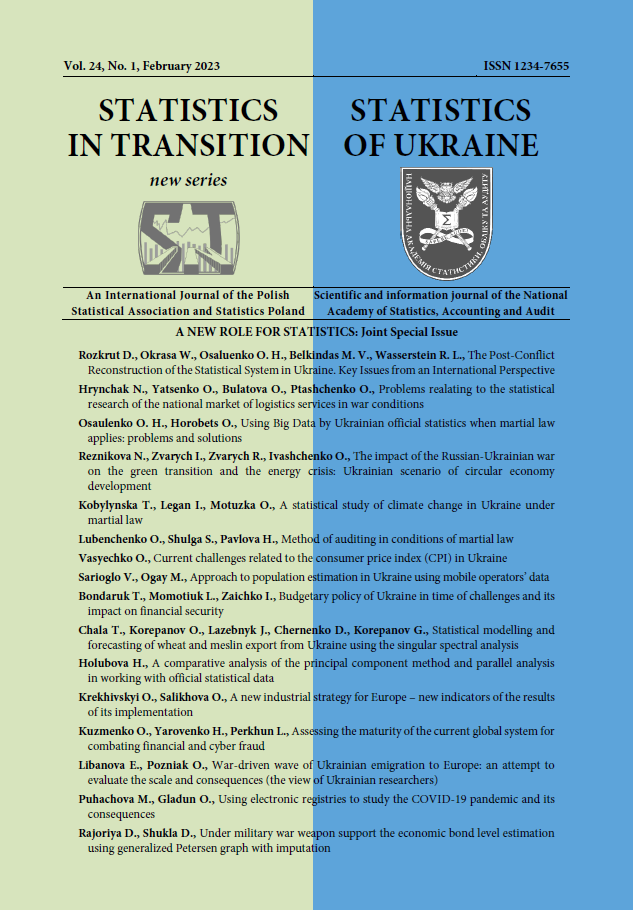© N. Reznikova, I. Zvarych, R. Zvarych, O. Ivashchenko. Article available under the CC BY-SA 4.0 licence
![]()
ARTICLE
ABSTRACT
The aim of the article is to minimise the impact of the energy crisis on the environment as one of the ways of getting rid of carbon footprints resulting from the growth of the russian energy and building a circular sustainable ecosystem in Ukraine. Therefore, the study proposes a classification of green inflation and singles out the following forms of its manifestation: 1) as a reaction to irresponsible management; 2) as a reaction to an attempt to implement large-scale projects aimed at decarbonisation within strict time limits; 3) as a reaction to the strengthening of business standards, which the end consumer will have to pay for. The paper determines the impact that the war has on the practice of applying resource nationalism associated with a wide variety of modern global problems. Discussions focus particularly on the following topics: the ‘resource curse’, the growing concern of the OECD countries. The paper identifies the dominant diversification tendencies in the EU in terms of the circularity of the economy. The proposed concept of a global inclusive circular economy can be considered as a complex multidimensional system, whose main components are based on the economic, sociological, environmental and circular aspects of life.
KEYWORDS
circular ecomomy, green transition, energy crisis, russian -ukrainian war, humanitarian crisis, global inclusive circular ecomomy.
REFERENCES
IPCC, (2022). Climate Change 2022: Mitigation of Climate Change. Retrieved from: https://www.ipcc.ch/report/sixth-assessment-report-working-group-3.
Ivashchenko, O. and Reznikova, N., (2018). Projections of Deglobalization in the Contemporary International Economic Relations in the Context of the Paradigm of Globalism. Bulletin of Mariupol State University. Series: Economics,15, pp. 98–106.
Krishnan, M., Nauclér, T., Pacthod, D., Pinner, D., Samandari, H., Smit, S. and Tai, H., (2021). Solving the net-zero equation: Nine requirements for a more orderly transition. Retrieved from: https://cutt.ly/QH8yheh.
Melnyk, T., Reznikova, N. and Ivashchenko, ?., (2020). Problems of statistical study of “green economics” and green growth potentials in the sustainable development context. Baltic Journal of Economic Studies, 6(3), pp. 87–98.
Reznikova, N., (2021). Economic situation of developed countries, Kyiv: Agrarian Media Group.
Samandari, H., Pinner, D., Bowcott, H. and White, O., (2022). The net-zero transition in the wake of the war in Ukraine: A detour, a derailment, or a different path? Retrieved from: https://cutt.ly/VH8yVWI.
Shnyrkov, O., Reznikova, N., Zvarych, R. and Zvarych, I., (2019). Global circular echain in overcomingthe global waste. Procedia Environmental Science, Engineering and Management, 6(4), pp. 641–647.
UNOCHA, (2022). Regional Refugee Response Plan of Ukraine for 2022. Retrieved from: https://cutt.ly/tH8oiGu.
White, O., Buehler, K., Smit, S., Greenberg, E., Mysore, M., Jain , R., Hirt, M., Govindarajan, A. and Chewning, E., (2022). War in Ukraine: Twelve disruptions changing the world. Retrieved from: https://cutt.ly/0H8uMTx.
Zhong, D.and Zvarych, I., (2022). Benchmarking of the circular economy in the world. Economic scope, 179, pp. 164–171.
